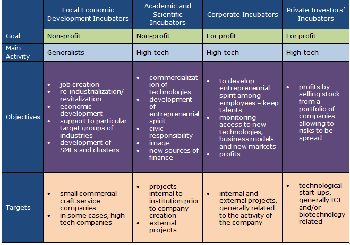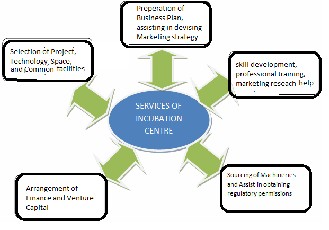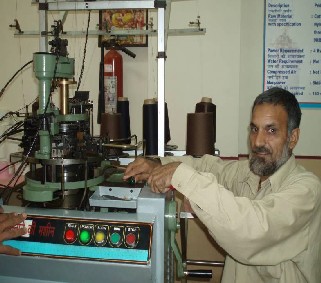The research paper published by IJSER journal is about Incubation of Micro and Small Enterprises- an approach to Local Economic Development 1
ISSN 2229-5518
Incubation of Micro and Small Enterprises- an approach to Local Economic Development
Pralay Dey
Abstract: Micro and Small Enterprises (MSEs) are important to almost all developing economies in the world, having major employment, import dependency, and income distribution challenges.
Establishing Micro and Small Enterprises (MSEs) is not a cake-walk despite having innovative inventions and ideas. It takes more than just having an idea of establishing a startup. Planning and arrangement of scarce resources like Finance, Infrastructure, Technology, Sourcing of raw materials, Marketplaces(buyers) and organizing Sales distribution channels are the major challenges for establishment and survival of any enterprise. Majority of startups fail in their first year of inception. Many of these failures can be prevented if entrepreneurs get handholding support by an Institution having specilaised Incubation programmes. An incubator’s main goal is to produce successful Micro and Small Enterprises with an array of targeted resources and services.
These incubates have the potential to create jobs, develop technology for import substitution, commercialize new technologies, and strengthen local and national economies.
Index Terms— Micro and Small Enterprises, Incubation, Incubator, Unemployment, Entrepreneur, Entrepreneurship, Hand holding support, projects, technology, Ideas, Finance, Marketing, business, economic, local, MSMEs, SMEs, Industry
—————————— ——————————
he Micro, Small and Medium enterprises (MSMEs) are known as the engine of growth as they provide substantial employment and distribute economic wealth uniformly across the society. The major advantage of the sector is its em- ployment potential at low capital cost. In many developing countries like India, Pakistan, Sri Lanka and Brazil, the MSMEs constitute over 90% of total enterprises and credited with generating the highest rates of employment growth and account for a major share in industrial production and exports. As an example, in India, the strength of of 26 million MSMEs play a significant role in the overall industrial economy of the
country.
According to Taka Munyanyiwa, Kenya [1], in Africa, eco- nomic powerhouses such as South Africa, Egypt, Nigeria and Kenya, the SME sector is estimated to contribute over 70 per- cent in employment and 30-40 percent contribution to GDP.
As per available census statistics [2] on India, this sector em- ploys an estimated 59.7 million persons spread over 26.1 mil- lion enterprises. It is estimated that in terms of value, MSME sector in India accounts for about 45% of the manufacturing output and around 40% of the total export of the country.
————————————————
![]() Pralay Dey is pursuing PhD from Shridhar University, Rajasthan, India. He is currently working as General Manager (Technology) in National Small Industries Corporation (NSIC), which is a Govt. of India of Enter- prise under Ministry of MSME and engaged in establishment & manag e- ment of Technical Incubation Centres in India and in ten various African
Pralay Dey is pursuing PhD from Shridhar University, Rajasthan, India. He is currently working as General Manager (Technology) in National Small Industries Corporation (NSIC), which is a Govt. of India of Enter- prise under Ministry of MSME and engaged in establishment & manag e- ment of Technical Incubation Centres in India and in ten various African
Worldwide, with its great flexibility and potential along with agility and dynamism, the sector has shown significant inno- vativeness and adaptability to survive the recent economic downturn and recession.
In India where MSMEs are predominant, Micro Enterprises are those which have Investments in Plant & Machinery less than Rs. 25.0 lacs (USD 50,000). Small Enterprises have In- vestment in Plant & machinery more than Rs. 25 lacs (USD
50,000) but does not exceed Rs. 5.0 crores (USD 1million). Medium Industries in Manufacturing have more than Rs. 5.0 crores (USD I million) but less than Rs. 10.0 crores (USD 2 mil- lions).
According to Susan Ward[3], in the European Union, a similar system is used to define Small to Medium Enterprises. A busi- ness with a headcount of fewer than 250 is classified as me- dium-sized; a business with a headcount of fewer than 50 is classified as small, and a business with a headcount of fewer than 10 is considered microbusiness. The European system also takes into account a business’s turnover rate and its bal- ance sheet.
Canada defines a small business as one that has fewer than
100 employees. Microbusiness is defined as a business with
fewer than five employees.
[1] SMEs key to economic growth, recovery by Taka Munyanyiwa, Kenya
Countries.
E-mail: pralay_99@hotmail.com, Ph. +91-11-26927502
IJSER © 2012
The research paper published by IJSER journal is about Incubation of Micro and Small Enterprises- an approach to Local Economic Development 2
ISSN 2229-5518
[2] 4th Census report, Ministry of MSME India
[3] Small Business- Canada by Susan Ward, About.com Guide
According to Indian Institute of Foreign Trade (IIFT) [4], in the United Kindom, SME is defined as a small company that has a turnover of not more than £5.6m, a balance sheet total of not more than £2.8m and not more than 50 employees.
In Australia, a micro enterprise is that which employs less than five employees and those employing between 5-19 per- sonnel are small and the medium enterprises are those that employ 20-200 employees.
In China, for defining an SME, those employing between 200-
2000 people and having sales between 30-300 m yuan or assets
in the range of 40-400m yuan are considered small and those
above this are medium level enterprises.
In Malaysia, a company is categorized as micro if it employs less than five persons, irrespective of sector. Small enterprises are those which have between 5 and 50 people in the case of primary agriculture and service sector and between 5 and 19 people in the case of manufacturing sector.
Starting a Business is an important aspect which every Entre- preneur should know before they venture out anything new.
Normally major processes of starting a small Business are
―Thinking About Starting, Find a Mentor or Counselor, Writ-
ing a Business Plan, Establishing a Business, Preparing Fin-
ances, Loans, Grants & Funding, Business Law & Regulations,
Marketing a New Business, Local Resources, Licenses & Per- mits.‖ [5]
However, following are the major hindrances for a start-up entrepreneur:-
Lack of motivation and experience are major problems for any start-up. The budding enterprise founders should find out if he or she has basic entrepreneul capabilities to start an enter- prise. Using various assessment tools, preparing business plans, following legal procedures, conducting Market Re- search, selection of Technology and Infrastructure and sourc- ing suitable Finance for the project are indeed tedious but im- portant processes. In many cases, taking assistance of a Men- tor is also essential.
Most of the successful entrepreneurs found to have taken help of other business owners within the same industry and shared experiences. Prolonged Marketing Research have tremend- oussly helped them in obtaining considerable knowledge in the field.
Entrepreneurs who wish to start a new business or carry out expansion of existing business have advantages when they
belong to a family-owned Enterprise. They are better placed and get the motivation and experience both from their parents and relatives who co-own the business, as and when required.
Adventures are usually risky missions, with an uncertain out- come. Business has all elements similar to undertaking an ad- venture. Despite having good ideas and ample resources, many enterprises fail leading to closing or bankruptcy and lose of invested wealth.
While doing business, various Business risks emerge. These risks may be broadly classified into two types, Internal and External Factors [6], depending upon their place of origin. In- ternal Risks cover Human Factors (Strikeslock-outs, negli- gence, problems of demnd-supply chain mangement etc.), Technology factors (technological obsolescence) and Physical factors (Fire, theft and machinery damages).
External factors cover Economic factors, Natural factors and Political factors. Economic factors result from the changes in the prevailing market conditions including demand for the product, price fluctuations, changes in tastes and preferences of the consumers
Natural factors are earthquake, flood, famine, cyclone etc. which can damage goods or services. Political factors relates to changes in Government policies and regulations which can affect business operations.
But then, risk has been always an integral part of any new business and a challenge which every entrepreneur has to face.
In many developing countries, the school/university passers and drop-outs look for jobs first and if they fail to do so, they think of becoming an entrepreneur. In most places, jobs are not available in plenty, be it Private sector or Government sec- tor and many of a time, not lucrative.
In self employment, there is no limit of earning as is the case of salaried employment. Quick decision making also adds to factors which acts as motivator for self-employment.
Many first-time entrepreneurs have the misconception that doing business is not labour intensive and they would lead a comfortable, stress-free and lavish life. Actually, becoming own boss includes a great amount of sacrifice of time and even family life.
It has been observed that entrepreneurship can be mentally, physically, and financially draining. Hence the entreprenuer needs support from all corners of society and particularly from his or her’s own family. The entreprenuer need to have a discussion with all family members who may be affected by his or her’s decision for starting a business. Maintaing a prop- er understanding with the entrepreneur, nurturing him or her
IJSER © 2012
The research paper published by IJSER journal is about Incubation of Micro and Small Enterprises- an approach to Local Economic Development 3
ISSN 2229-5518
by providing all resources including knowledge and finance, family can also create a budding entreprenuer.
[4] Centre for SME studies, IIFT, India
[5] ( US Small Business Association website)
[6] (Types of business risks, Business portal of India, National In- formatics Centre)
Many people become self employed for the financial gain but remain in hand-to-mouth situation. Interestingly, the fact which is important to note that all entrepreneurs are self- employed but not all self-employed are entrepreneurs.
The spirit of entrepreneurship is the tendency to see beyond this monetary gain. An entrepreneur is a person who always looks for change. New ideas, innovation in technology, crea- tivity are strengths which drives entrepreneurs ahead.
According to the EU Centre for Strategy & Evaluation Servic- es[7]: A business incubator is an organization that accelerates and systematizes the process of creating successful enterprises by providing them with a comprehensive and integrated range of support, including: incubator space, business support services, and clustering and networking opportunities. A suc- cessful business incubator will generate a steady flow of new businesses with above average job and wealth creation poten- tial
The UKBI (UK Business Incubation) definition[8] states that: Incubation is a unique and highly flexible combination of business development processes, infrastructure and people, designed to nurture and grow new and small businesses by supporting them through early stages of development and change.
Incubators are available in various types rendering a range of long and short-term assistances and they help in establishment of new enterprise in one way or other. Many of these provide only guidance, technical assistance and consulting to entre- preneurs and offer Business Development services. ICT incu- bators are major examples of these Incubators where clients access to appropriate rental space, shared basic business ser- vices and equipment. Few incubators assist only in developing new ideas and arrange for venture capital funding. Incubators are some times known as Business Acceleretor as it accelerates start-ups by providing quick knowledge, support services and resources.
Technical Incubation Centre, NSIC, New Delhi, India
The definition of Incubators varies with their delivery of ser- vices. Many a times, there are known as business accelerator as they act boot camps for freshers to start enterprises. Highly adaptable, incubators have differing goals, including diversi- fying rural economies, providing employment and increasing wealth of local communities, and transferring technology from universities and major corporations. Incubator clients are at the forefront of developing new and innovative technologies – creating products and services that improve the quality of our lives in communities around the world.

Adapted from "Best Practices for Managing Incubators", Rahul Patwardan, IndiaCo
Several years back, the initial model of incubation programs were based on leasing out infrastructure and common facility equipment to the entrepreneurs, in few focused areas. Howev- er, in more recent years, new incubators have have been set up in areas of ICT, food processing, light engineering, Health care technologies, packaging, ceramics technologies, arts and crafts, product design and knowledge management. Many of them provide an opportunity to first generation entrepreneurs to acquire skill for enterprise building and also incubating them to become successful small business owners. At these centres, exposure in all areas of business operations are being provided such as business skills development, identification of appropriate technology, hands on experience on working pro- jects, project / product selection, opportunity guidance includ- ing commercial aspects of business.
[7] EU Centre for Strategy & Evaluation Services
[8] UKBI (UK Business Incubation)

IJSER © 2012
The research paper published by IJSER journal is about Incubation of Micro and Small Enterprises- an approach to Local Economic Development 4
ISSN 2229-5518
HAND HOLDING SERVICES OF A BUSINESS INCUBATOR


A Trainee learning production techniques in

Technology Incubator in India
Incubator for Gemstone cutting and polishing,RGVT, Mongolia
Establishing a micro or small enterprise or per se any business, is not an easy task. There is a great amount of entrepreneur- ship skill and knowledge needed for sustenance and growth. It takes several months to years to gather information, garner knowledge, skills and resources to start and run any micro or small enterprise.
Generally this is achieved by peer surveys, talking to other business owners within the same industry who can give prac- tical advice. Conduct of independent research to find out ap- propriate technology, marketing intelligence, sources of Finance, Supply chain identification, demand assessment & forecasting, raw material availability etc. helps entrepreneur in decision making. However, all these are difficult inputs to ac- quire but imperative for any enterprise to become successful.
In nutshell, a Budding entrepreneur needs comprehensive and integrated range of support, including: space, business sup- port services, clustering and networking opportunities, Finance, Technology and Marketing assistance.
Business and Technology Incubation process is perhaps the panacea for the above. Start-ups can quickly learn and obtain support services as mentioned above through an emulated environment of an Incubator.
Business/ Technology incubators provide incubates the re- quired hand holding services and resources such as mentor- ing, networking with angel investors, assistance in prepara- tion of business plan. It also helps in obtaining financing. In- cubators also offer companies rental space with flexible leases, shared basic office services and access to equipment and common facilities.
Realizing the challenges of the entrepreneurship, Government, Research Institutions, Private sector and various Universities have geared up and established many Business/ Technology Incubators with an aim to nurture the start-up small enterpris- es.
Various Governments have also initiated several schemes and devised incentives to assist the entrepreneurs.
Enterprise development in any country leads to local econom- ic development. Entrepreneurs intend to start their business with minimum risk and investment. Innovation, Growth and sustenance of the business are another set of challenges for them. An incubator addresses these challenges and nurtures the development of entrepreneurship, helping them survive during start-up periods, when they are volnureable.
IJSER © 2012
The research paper published by IJSER journal is about Incubation of Micro and Small Enterprises- an approach to Local Economic Development 5
ISSN 2229-5518
[1] SMEs key to economic growth, recovery by Taka Munyanyiwa, Kenya
[2] 4th Census report, Ministry of MSME India
[3] Small Business- Canada by Susan Ward, About.com Guide
[4] Centre for SME studies, IIFT, India
[5] (Types of business risks, Business portal of India, National Informat- ics Centre),
[6] ( US Small Business Association website)
[7] EU Centre for Strategy & Evaluation Services
[8] UKBI (UK Business Incubation)
[9] Best Practices for Managing Incubators, Rahul Patwardan, IndiaCo
[10] European Commission 96/280/EC report, Commission Recommen- dation of 3 April 1996.
[11] Annual Report 2011, Ministry of Micro, Small & Medium Enterprises, India
[12] Promoting Business and Technology Incubation for Improved Competitive- ness of Small and Medium-sized Industries through application of Modern and efficient Technologies, ESCAP Report
[13] Policies and Support for Promotion of Business and Technology Incubation in
India by Mr. P.K.B. Menon, Head, Department of Science and Technology, Ministry of Science and Technology, New Delhi, India, and Mr. Pradeep Ba- vadekar, Managing Director, Mitcon Consultancy Services Limited, Pune, Maharashtra
[14] Dr P.T. Ajith Kumar, Promoter, Light Logics Holography and Optics Pvt. Ltd, Technopark, Trivandrum
[15] Impact of Business Incubation in the Lessons for Developing Countries, Na- tional Business Incubation Association USA
[16] Global Practice in Incubation Policy Development and Implementation New
Zealand Incubation Country Case Study
[17] The U.S. Small Business Administration Administers The Small Business
Development Center (SBDC)
IJSER © 2012